uint4 what is happiness课后答案教学提纲
新概念英语第四册课后习题答案教学提纲

新概念英语第四册课后习题答案新概念英语第四册课后习题答案Unit 1 CABDD BDAAC AB Unit 2 BCBDC ACAAD BC Unit 3 CABDA CDABA CD Unit 4 ACCAB BCDAA BD Unit 5 CABAB DACBB DD Unit 6 CACCC AAADB AA Unit 7 DCABA BACDA AC Unit 8 BDABD BAABC BC Unit 9 CDBAA CABAC AD Unit 10 CAABD CBBDC AA Unit 11 AABDD DADDB DD Unit 12 CABAC CDACA AB Unit 13 ACDAC BDABC AD Unit 14 DBDCC ACCBD BD Unit 15 CADCD DBACA CA Unit 16 ABCCA DDBAB AC Unit 17 BBADA BBDCD CA Unit 18 BABCD CDCCC BA Unit 19 BBCAD AABDD BC Unit 20 BCADC CCBDB CA Unit 21 BDBBA ADDAB CA Unit 22 CDACB ADBCD AB Unit 23 CADCC DCABC AC Unit 24 AACCB CADDA CD Unit 25 DBADD CACDB CA Unit 26 CBCBA CDDAB AC Unit 27 BCDCC ACCDD DA Unit 28 ADCDA BCADA BD Unit 29 CCADD CCADA BC Unit 30 CABDD BCCAC DC Unit 31 AABAD BADDC BD Unit 32 BDCBA DBDCA BC Unit 33 BDBAD BCCDC BA Unit 34 DCACB DACDB CA Unit 35 CBCAC ABBDC CD Unit 36 ACBCC ACCDB AC Unit 37 CABAC DBCDC BD Unit 38 CAABB ACBDD AB Unit 39 BCADA BDDBD BC Unit 40 DCDAC ADDDA DB Unit 41 ACACD CBBBD BC Unit 42 BCCBD BDADC AC Unit 43 DBABC CDDAC BB Unit 44 AAAAB BBBDC BA Unit 45 CADAC CACDC DC Unit 46 BBDBD ABCDA BD Unit 47 CAADB CACDB BC Unit 48 CCBCC CCDBA AB新概念4 笔记/nce/24278_2.shtmlUnit 1 Finding fossil man一、重点单词解释1、recount:v.叙述注意读音,重音在后。
Unit-4what is happiness
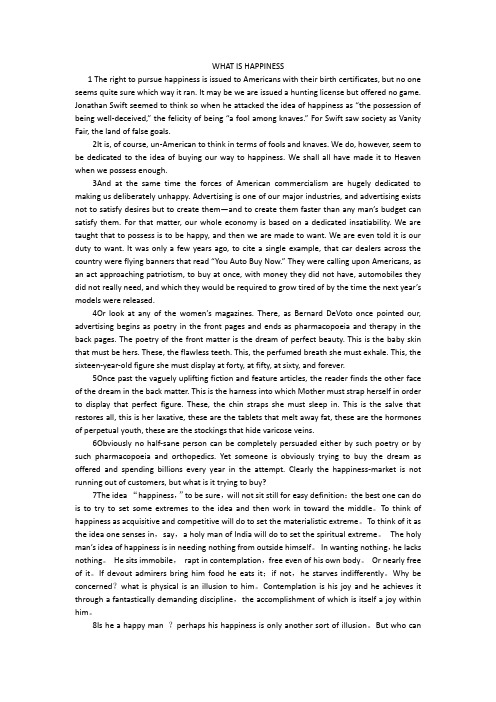
WHAT IS HAPPINESS1 The right to pursue happiness is issued to Americans with their birth certificates, but no one seems quite sure which way it ran. It may be we are issued a hunting license but offered no game. Jonathan Swift seemed to think so when he attacked the idea of happiness as “the possession of being well-deceived,” the felicity of being “a fool among knaves.” For Swift saw society as Vanity Fair, the land of false goals.2It is, of course, un-American to think in terms of fools and knaves. We do, however, seem to be dedicated to the idea of buying our way to happiness. We shall all have made it to Heaven when we possess enough.3And at the same time the forces of American commercialism are hugely dedicated to making us deliberately unhappy. Advertising is one of our major industries, and advertising exists not to satisfy desires but to create them—and to create them faster than any man’s budget can satisfy them. For that matter, our whole economy is based on a dedicated insatiability. We are taught that to possess is to be happy, and then we are made to want. We are even told it is our duty to want. It was only a few years ago, to cite a single example, that car dealers across the country were flying banners that read “You Auto Buy Now.” They we re calling upon Americans, as an act approaching patriotism, to buy at once, with money they did not have, automobiles they did not really need, and which they would be required to grow tired of by the time the next year’s models were released.4Or look at any of the women’s magazines. There, as Bernard DeVoto once pointed our, advertising begins as poetry in the front pages and ends as pharmacopoeia and therapy in the back pages. The poetry of the front matter is the dream of perfect beauty. This is the baby skin that must be hers. These, the flawless teeth. This, the perfumed breath she must exhale. This, the sixteen-year-old figure she must display at forty, at fifty, at sixty, and forever.5Once past the vaguely uplifting fiction and feature articles, the reader finds the other face of the dream in the back matter. This is the harness into which Mother must strap herself in order to display that perfect figure. These, the chin straps she must sleep in. This is the salve that restores all, this is her laxative, these are the tablets that melt away fat, these are the hormones of perpetual youth, these are the stockings that hide varicose veins.6Obviously no half-sane person can be completely persuaded either by such poetry or by such pharmacopoeia and orthopedics. Yet someone is obviously trying to buy the dream as offered and spending billions every year in the attempt. Clearly the happiness-market is not running out of customers, but what is it trying to buy?7The idea “happiness,”to be sure,will not sit still for easy definition:the best one can do is to try to set some extremes to the idea and then work in toward the middle。
what-is-happiness-PPT课件

•2
●extreme
Para.7
adj.
1.极度的,极大的 We are working under extreme pressure at the moment.
•8
Para.7
• That holy man’s idea of happiness is in needing nothing from outside himself. In wanting nothing, he lacks nothing. He sits immobile, rapt in contemplation, free even of his own body. Or nearly free of it.
n.1.极端,极度;2.把某事引向极端;carry sth to extremes
•3
3.极度,非常 in the extreme
Para.7
•To think of happiness as acquisitive and competitive will do to set the materialistic extreme. To think of it as the idea one senses in, say, a holy man of India will do to set the spiritual extreme. 把幸福认为是可得到的和可竞争来的话会确立 唯物论的极限。将其视为一个人(比如印度的 圣人)所感知的信念,就会确立精神上的极 限。
Para.7
UnitWhatIsHappiness答案综合教程二.doc
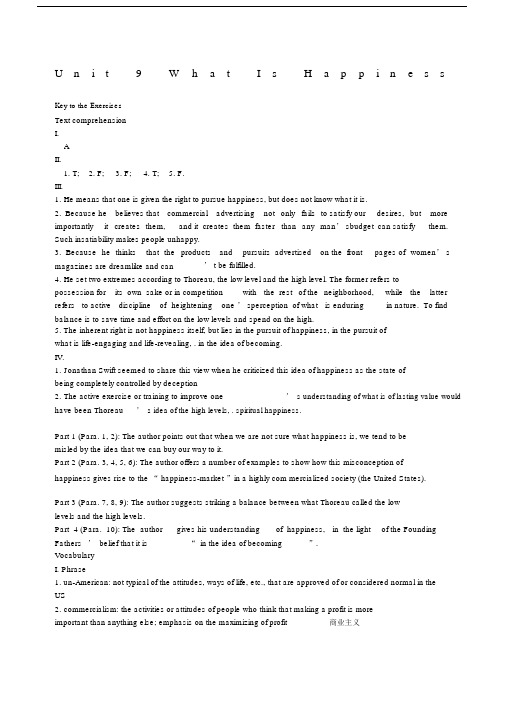
U n i t9W h a t I s H a p p i n e s sKey to the ExercisesText comprehensionI.AII.1. T;2. F;3. F;4. T;5. F.III.1. He means that one is given the right to pursue happiness, but does not know what it is.2. Because he believes that commercial advertising not only fails to satisfy our desires, but more importantly it creates them, and it creates them faster than any man’ sbudget can satisfy them. Such insatiability makes people unhappy.3. Because he thinks that the products and pursuits advertised on the front pages of women’ s magazines are dreamlike and can ’ t be fulfilled.4. He set two extremes according to Thoreau, the low level and the high level. The former refers topossession for its own sake or in competition with the rest of the neighborhood, while the latter refers to active discipline of heightening one ’ sperception of what is enduring in nature. To find balance is to save time and effort on the low levels and spend on the high.5.The inherent right is not happiness itself, but lies in the pursuit of happiness, in the pursuit ofwhat is life-engaging and life-revealing, . in the idea of becoming.IV.1.Jonathan Swift seemed to share this view when he criticized this idea of happiness as the state ofbeing completely controlled by deception2. The active exercise or training to improve one’ s understanding of what is of lasting value would have been Thoreau’ s idea of the high levels, . spiritual happiness.Part 1 (Para. 1, 2): The author points out that when we are not sure what happiness is, we tend to bemisled by the idea that we can buy our way to it.Part 2 (Para. 3, 4, 5, 6): The author offers a number of examples to show how this misconception ofhappiness gives rise to the “ happiness-market ”in a highly com mercialized society (the United States).Part 3 (Para. 7, 8, 9): The author suggests striking a balance between what Thoreau called the lowlevels and the high levels.Part 4 (Para. 10): The author gives his understanding of happiness, in the light of the Founding Fathers’ belief that it is“ in the idea of becoming”.VocabularyI. Phrase1.un-American: not typical of the attitudes, ways of life, etc., that are approved of or considered normal in theUSmercialism: the activities or attitudes of people who think that making a profit is moreimportant than anything else; emphasis on the maximizing of profit商业主义3. for that matter: it is also true that (The phrase “ for that matter ” is used to emphasize that though mentioned second, is also true, important, or relevant as what has been mentioned earlier.)就此而论,在这方面, 同样4. face: aspect 方面5. in nature: essentially 事实上,本质上II.1. perpetual;2. functions;3. inherent;4. cited;5. approaching;6. flawless;7. vaguely;8. disciplining.III. Word derivationFill in the blanks with the appropriate forms of the given words.1. pursuit2. deception3. dedication4. commercial5. patriotic6. fictional7. disapproval8. starvingIV.1. C;2. B;3. D;4. B;5. D;6. A;7. C;8. D.1.hugely — Synonym: enormously, tremendously;deliberately — Antonym: unintentionally, accidentally2.Synonym: perfect, spotless3.Antonym: inhale4.Antonym: impartial, unbiased5.Antonym: imbalance6.Synonym: have, own7.Synonym: fixed, stationary, quiet1. contain obtain2. concede precede3. compel repel4. suspend depend5. include conclude6. insist consist7. descend ascend8. evolve revolve1.yourself;2.You / We; you / we3.you / one / we4.it5.one another6.They / We7.myself8.yourself9.it10.I; We; They; us; They; it; weII.There; There; There; There; There;It; there; There; It; there.ThereIII.Replace the underlined parts in the following sentences with non-finite clauses or verbless clauses.1. While flattered,2. whether to go upstairs or to follow3. Whenever possible,4.if left untreated.5.if ready.6. Though no swimmer,7. Once over the pass,8. Whether by accident or by design,1.Once;2.Though;3.If;4.when;5.whether;6.Unless;7.Before;8.After.V.1. c;2. b;3. b;4. c;5. a;6. d;7. d;8. d.TranslationI.1. 广告是一项主要产业,它的存在与其说是为了满足人们的欲望;不如说是为了激发他们的欲望——而且是以超出任何人的收入所能承受的速度激发这些欲望。
What is happiness to you教案

What is happiness to you教案What is happiness to you Unit 2銆奧hat is happiness to you銆?Grammar Teaching goals 1. Ability goals Enable the students to use the past and the future tenses properly. 2. Learning ability goals爣Help the students learn how to use the past and the future tenses. Teaching importan t points The usage of the past and the future tenses. Teaching difficult points How to teach the students to use the past and the future tenses. Teaching methods Explaining and practising. Teaching aids A multimedia computer. Teaching procedures锛?ways ?Step鈪?Revision T: Yesterday, we learned some words and also some English idioms about emotions. Let鈥檚have a revision. Try to explain them in English. The first one: hot under the collar? S: The idiom means that somebody is very angry. T: Do you a gree? Ss: Yes. T: Next one: down in the dumps? S: Let me have a try. The idiom expressed the feeling of sadness. T: You are right. The last one: on cloud nine? S: That means someone is very happy. T: C orrect!You all have done a good revision.Step鈪?Presentation Show students the following sentences, and ask them to speak out the difference. 1. He went to Paris two years ago. 2. He will go to Paris next year. T: Please look at the two sentences. Can you tell the difference between them? S: The first sentence talks about something that happened in the past and the second sentence talks about something that happens in the future. T: Exactly!Step 鈪?Explanation Get the students to talk about the different forms of the past tense and the future tense. T: We have learned what the past tense is and what the future tense is. There are many forms of each tense. Let鈥檚deal with the past tense first. Please look at the following sentences. Show students the followingsentences. 1. Sang Lan was born in Ningbo, China in 1981. 2. She knew that in those years she was making her parents proud. 3. Instead of crying about what she had lost, Sang Lan thought about what she could do to get better. 4. By the time she competed in the New York Goodwill Games, she had been a dedicated junior gymnast for eleven years. T: First, look at the four sentences. Do they have something in common? S: Yes! They all use the past tense. T: But there are also differences among them. Can you tell the differences? Next, discuss with your partners. Pay attention to the italic words. Several minutes later. T: Can you show your opinions now? Ss: Yes. S: In the first sentence we use the simple past tense to talk about something happened in the past. T: Very good. What about the second sentence? S: I think it means something happened in the past and continued for some time. T: Very good! Thank you! Now let鈥檚move to the last two sentences. S: They are both used in the past perfect tense. By looking at the two sentences, I think we u se the past per fect tense to talk about things that happened in the past and stopped before another past action began. T: Excellent! But I think you are partly right. Do the two sentences express the same meaning? S: The fourth sentence means the thing happened in the past and at that time another past action began. T: That鈥檚it! Just now we talked about different forms of the past tense. And later, we will do more practice about them. Now let鈥檚move to the future tense. Please look at the following sentences. Can you tell the difference? Show students the following sentences: 1. She will come with us to watch the football match tomorrow. 2. I shall work hard and learn to become a gymnast. 3. Today, I鈥檓going to talk about how to find happiness. 4. Dr Brain will be talking about success next time. 5. Before she went to the Goodwill Games, Sang Lan told her parents she was going to win her event. Several minutes later T: Are you ready to show me your answers? Ss: Yes! S: I will have a try. In sentences1, 2, 3 the simple future tense is used. When the subject is the first person, we usually use shall instead of will. T: You are ri ght. Then whenshall we use 鈥渂e going to鈥? S: I think when we want to talk about future plans and intentions, we can use 鈥渂e going to鈥? T: Very good. You got the answer. What about sentence 4? S: Sentence 4 uses the future continuous tense. This sentence is used to talk about something that will start in the future and continue for some time. T: Excellent! The fifth sentence is used in the future in the past. When shall we use this tense? S: When we want to talk about an event which was in the future at the time when it was discussed. T: You got the answer. Good job! Next I鈥檒l show you further explanations about future tense. Show the following to the students and ask them to take some notes. 1. will / shall doユ垨涓存椂鍋氬嚭鐨勫喅瀹氾紝涔熷彲琛ㄧず涓€绉嶅繀鐒剁殑瓒嬪娍銆?2. be going to do 琛ㄧず鎵撶畻锛屽噯澶囧仛鏌愪簨锛屼篃琛ㄧず鏍规嵁鏌愮?3. be doing 琛ㄧず鏈€杩戞寜璁″垝锛?4. be about to do 鍗曠函琛?绀哄嵆灏嗗彂鐢熺殑鍔ㄤ綔锛屽父涓巜hen 杩炵敤锛屾剰涓?杩欐椂"锛屼?5.皢鏉ユ椂锛屾寚鏃╁凡璁″垝濂斤紝鍒版椂涓€瀹氫細鍙戠敓鐨勪簨锛屼篃鍙簨銆?Step 鈪?Consolidation Help the students do some exercises to practice using the past and the future tenses. T: Next, let鈥檚do some practice. Please open your books to Page 25 and do Exercises A && B. Several minutes later, check the answers. Step鈪?Practice Give the stu dents more exercises. If time is limited, this part can be assigned as the homework. 1. If a man _____ succeed, he must work as hard as he can. A. will B. is to C. is going to D. would 2. I鈥檝e won a holiday for two weeks to Florida. I _____ my mom. A. am taking B. have taken C. take D. will have taken 3. The train _____ for the city a t ten, so you have enough time to make preparations. A. leaves B. is leaving C. is to leave D. is going to leave 4. 鈥昗hy have you bought so much food? 鈥昐ome friends of mine _____ to stay with me for the weekend. A.come B. were coming C. will have come D. are coming 5. 鈥昚ou鈥檝e left the light on. 鈥昈h, _____ and turn it off. A. I鈥檒l go B. I鈥檝e gone C. I go D. I鈥檓going 6. All morning as she waited for the medical report from the doctor, her nervousness _____. A. has grown B. is growing C. grew D. had grown 7. The mayor of Beijing says that all construction work for the Beijing Olympics _____ by 2006. A. has been completed B. has completed C. will have been completed D. will have completed 8. Sales of CDs have greatly increased since the early 1990s, when people _____ to enjoy the advantages of this new technology. A. begin B. began C. have began D. had begun 9. Turn on the television or open a magazine and you _____ advertisements showing happy families. A. will often see B. often see C. are often seeing D. have often seen 10. I _____ you not to move my dictionary 鈥?now I can鈥檛find it. A. asked B. ask C. was asking D. had asked 11. When Mark opened the door, he saw a woman standing there. He _____ her before. A. never saw B. had never seen C. never sees D. has never seen 12. 鈥旸id you tell Julia about the result? 鈥昈h, no, I forgot.I _____ her now. A. will be calling B. will call C. call D. a m to call 13. He _____ more than 5,000 English words when he entered the university at the age of 15. A. has learned B. would have learned C. learned D. had learned 14. 鈥昗hy did you leave that position? 鈥旾_____ a better position at IBM. A. offer B. offered C. am offered D. was offered 15. 鈥昗hat鈥檚wrong with your coat? 鈥旿ust now when I wanted to get off the bus, the man next to me _____ on it. A. sat B. had sat C. had been sitting D. was sitting 16. 鈥昗hat are you going to do this afternoon? 鈥旾am going to the cinema with some friends. The film _____ quite early, so we _____ to the bookstore after that. A. finished; are going B. finished; go C. finishes; are going D. finishes; go 17. 鈥旾f the traffic hadn鈥檛been so heavy, I could have been back by 6 o鈥檆lo ck. 鈥昗hat a pity! Tina _____ here to see you. A. is B. was C. would be D. has been 18. 鈥旽urry up! Alice and Sue are waiting for you at the school gate. 鈥昈h! I thought they _____ without me. A. went B. are going C. have gone D. hadgone 19. They _____ on the program for almost one week before I joined them, and now we _____ on it as no good results have come out so far. A. had been working; are still working B. had worked; were still working C. have been working; have worked D. have worked; are still working 20. Susan decided not to work on the program at home because she didn鈥檛want her parents to know what she _____.A. has doneB. had doneC. was doingD. is doing Key: 1-5 BAADA 6-10 CCBAA 11-15 BBDDD 16-20 CBDACStep 鈪?Homework 1. Review the grammar points you learned in this period. 2. Finish the multiple choice exercises.。
高二英语What-is-happiness-to-you课件
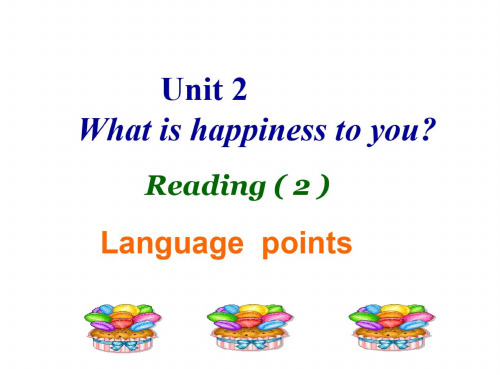
高二英语What-is-happiness-to-you课件7学习课件
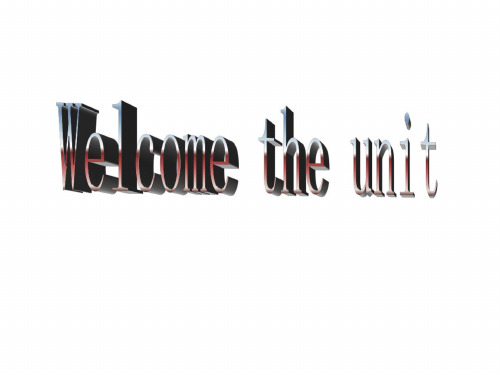
有时候我们也会搀扶着爸爸、妈妈到外地旅游,但是最多待到第三天,妈妈就急着要返回,理由是:想菜场了。
从我的父母亲,马兰想到了她的父母亲。她爸爸是“老右派”,小县城街上的任何人都可以侮辱他。她十三岁时考上了省艺术学校,却因为是“右派的女儿”未被批准入学。那时她妈妈也是一名主 角演员,正在山区巡回演出,当天晚上决定以罢演来抗议当局祸及女儿。她妈妈是准备为此而加重罪孽的,除此之外,她没有别的路可走。幸好,一个当时在场的当权者看到漫山遍野山民来看戏的火炬, 勉强批准了马兰入学。灾难结束后,她先为爸爸“平反”了,因为县城里公映了她主演的电影《龙女》。她又用当时还很微薄的片酬买了一件时髦的滑雪衫给爸爸。爸爸穿上后,把整个县城都走了一遍。 他用一件滑雪衫,嘲笑了二十年的街道。
看着已经没有衣食之忧却已经很苍老的四位父母,我和马兰一再告诉他们:灾难时代过去了,真的,永远过去了。
我辞职后每次去看父母亲,其实都是远行前的告别。
告别父母亲之后我和马兰总要在路上走一阵。马兰说:“我知道,对于安慰
What is happiness课文答案
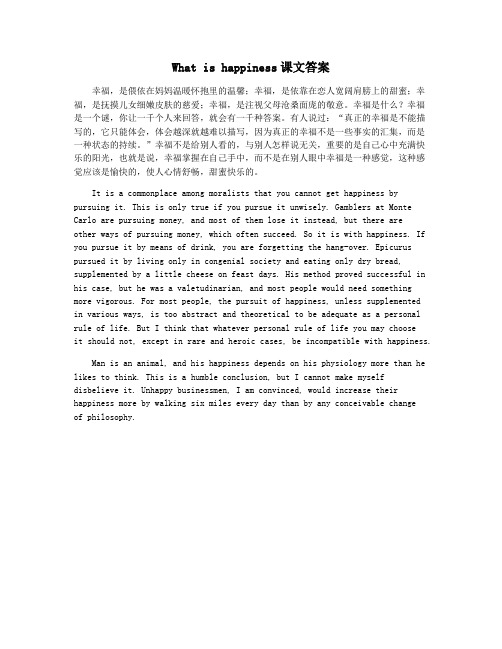
What is happiness课文答案幸福,是偎依在妈妈温暖怀抱里的温馨;幸福,是依靠在恋人宽阔肩膀上的甜蜜;幸福,是抚摸儿女细嫩皮肤的慈爱;幸福,是注视父母沧桑面庞的敬意。
幸福是什么?幸福是一个谜,你让一千个人来回答,就会有一千种答案。
有人说过:“真正的幸福是不能描写的,它只能体会,体会越深就越难以描写,因为真正的幸福不是一些事实的汇集,而是一种状态的持续。
”幸福不是给别人看的,与别人怎样说无关,重要的是自己心中充满快乐的阳光,也就是说,幸福掌握在自己手中,而不是在别人眼中幸福是一种感觉,这种感觉应该是愉快的,使人心情舒畅,甜蜜快乐的。
It is a commonplace among moralists that you cannot get happiness by pursuing it. This is only true if you pursue it unwisely. Gamblers at Monte Carlo are pursuing money, and most of them lose it instead, but there areother ways of pursuing money, which often succeed. So it is with happiness. If you pursue it by means of drink, you are forgetting the hang-over. Epicurus pursued it by living only in congenial society and eating only dry bread, supplemented by a little cheese on feast days. His method proved successful in his case, but he was a valetudinarian, and most people would need something more vigorous. For most people, the pursuit of happiness, unless supplemented in various ways, is too abstract and theoretical to be adequate as a personal rule of life. But I think that whatever personal rule of life you may chooseit should not, except in rare and heroic cases, be incompatible with happiness.Man is an animal, and his happiness depends on his physiology more than he likes to think. This is a humble conclusion, but I cannot make myself disbelieve it. Unhappy businessmen, I am convinced, would increase their happiness more by walking six miles every day than by any conceivable changeof philosophy.。
What is happiness to you上课学习上课学习教案

What is happiness to you教案whatishappinesstoyou教案Unit2《whatishappinesstoyou》GrammarTeachinggoals教学目标.Abilitygoals能力目标Enablethestudentstousethepastandthefuturetensesprop erly.2.Learningabilitygoals学能目标Helpthestudentslearnhowtousethepastandthefuturetens es.Teachingimportantpoints教学重点Theusageofthepastandthefuturetenses.Teachingdifficultpoints教学难点Howtoteachthestudentstousethepastandthefuturetenses.Teachingmethods教学方法Explainingandpractising.Teachingaids教具准备Amultimediacomputer.Teachingprocedures&ways教学过程与方式StepⅠRevisionT:yesterday,welearnedsomewordsandalsosomeEnglishidi omsaboutemotions.Let’shavearevision.TrytoexplaintheminEnglish.Thefirston e:hotunderthecollar?S:Theidiommeansthatsomebodyisveryangry.T:Doyouagree?Ss:yes.T:Nextone:downinthedumps?S:Letmehaveatry.Theidiomexpressedthefeelingofsadnes s.T:youareright.Thelastone:oncloudnine?S:Thatmeanssomeoneisveryhappy.T:correct!youallhavedoneagoodrevision.StepⅡPresentationShowstudentsthefollowingsentences,andaskthemtospeak outthedifference..HewenttoParistwoyearsago.2.HewillgotoParisnextyear.T:Pleaselookatthetwosentences.canyoutellthedifferen cebetweenthem?S:Thefirstsentencetalksaboutsomethingthathappenedin thepastandthesecondsentencetalksaboutsomethingthath appensinthefuture.T:Exactly!StepⅢExplanationGetthestudentstotalkaboutthedifferentformsofthepast tenseandthefuturetense.T:wehavelearnedwhatthepasttenseisandwhatthefuturete nseis.Therearemanyformsofeachtense.Let’sdealwiththepasttensefirst.Pleaselookatthefollowing sentences.Showstudentsthefollowingsentences..SangLanwasborninNingbo,chinain1981.2.Sheknewthatinthoseyearsshewasmakingherparentsprou3.Insteadofcryingaboutwhatshehadlost,SangLanthought aboutwhatshecoulddotogetbetter.4.BythetimeshecompetedintheNewyorkGoodwillGames,she hadbeenadedicatedjuniorgymnastforelevenyears.T:First,lookatthefoursentences.Dotheyhavesomethingi ncommon?S:yes!Theyallusethepasttense.T:Buttherearealsodifferencesamongthem.canyoutellthe differences?Next,discusswithyourpartners.Payattenti ontotheitalicwords.Severalminuteslater.T:canyoushowyouropinionsnow?Ss:yes.S:Inthefirstsentenceweusethesimplepasttensetotalkab outsomethinghappenedinthepast.T:Verygood.whataboutthesecondsentence?S:Ithinkitmeanssomethinghappenedinthepastandcontinu edforsometime.T:Verygood!Thankyou!Nowlet’smovetothelasttwosentences.S:Theyarebothusedinthepastperfecttense.Bylookingatt hetwosentences,Ithinkweusethepastperfecttensetotalk aboutthingsthathappenedinthepastandstoppedbeforeano therpastactionbegan.T:Excellent!ButIthinkyouarepartlyright.Dothetwosent encesexpressthesamemeaning?S:Thefourthsentencemeansthethinghappenedinthepastan datthattimeanotherpastactionbegan.T:That’sit!justnowwetalkedaboutdifferentformsofthepasttens e.Andlater,wewilldomorepracticeaboutthem.Nowlet’smovetothefuturetense.Pleaselookatthefollowingsente nces.canyoutellthedifference?Showstudentsthefollowingsentences:.Shewillcomewithustowatchthefootballmatchtomorr ow.2.Ishallworkhardandlearntobecomeagymnast.3.Today,I’mgoingtotalkabouthowtofindhappiness.4.DrBrainwillbetalkingaboutsuccessnexttime.5.BeforeshewenttotheGoodwillGames,SangLantoldherpar entsshewasgoingtowinherevent.SeveralminuteslaterT:Areyoureadytoshowmeyouranswers?Ss:yes!S:Iwillhaveatry.Insentences1,2,3thesimplefuturetenseisused.whenthesubjectisthefirst person,weusuallyuseshallinsteadofwill.T:youareright.Thenwhenshallweuse“begoingto”?S:Ithinkwhenwewanttotalkaboutfutureplansandintentio ns,wecanuse“begoingto”.T:Verygood.yougottheanswer.whataboutsentence4?S:Sentence4usesthefuturecontinuoustense.Thissentenc eisusedtotalkaboutsomethingthatwillstartinthefuture andcontinueforsometime.T:Excellent!Thefifthsentenceisusedinthefutureinthep ast.whenshallweusethistense?S:whenwewanttotalkaboutaneventwhichwasinthefutureat thetimewhenitwasdiscussed.T:yougottheanswer.Goodjob!NextI’llshowyoufurtherexplanationsaboutfuturetense.Showthefollowingtothestudentsandaskthemtotakesomeno tes..will/shalldo表示纯粹的将来或临时做出的决定,也可表示一种必然的趋势。
高二英语What-is-happiness-to-you课件4

[单选]话务员在受理业务时,回答问题要热情、(),不能用讨厌生硬的语调。A、随意B、简单C、严肃D、耐心 [单选]皮肤内最常见的肌肉类型是()A.乳晕平滑肌B.血管壁平滑肌C.立毛肌D.表情肌E.颈阔肌 [问答题,简答题]货运检查主要内容有那些? [单选]在一般智能建筑系统中,应优先考虑使用的火灾探测器为()。A.感烟火灾探测器B.感光火灾探测器C.感温火灾探测器D.气体火灾探测器 [单选]关于牙龈卟啉单胞菌的生物特性,哪种叙述是正确的()A.兼性厌氧菌B.为革兰阳性有芽孢的杆菌C.细菌表面无纤毛D.为革兰阴性无芽孢的杆菌E.在血平板上可形成特征性的白色菌落 [填空题]主断路器连接于受电弓及主变压器原边绕组之间,安装在机车车顶中部,它是交流电力机车电源的()和机车的总保护。 [单选]下列关于会计主体,说法不正确的是()。A.会计主体是指会计信息所反映的特定单位B.会计主体也称为会计实体、会计个体C.会计主体不同于法律主体D.会计主体一定是法律主体 [单选,A1型题]有关检查胎位的四步触诊法,哪项是错误的()A.用以了解子宫的大小、胎先露、胎方位B.第三步是双手置于耻骨联合上方,弄清先露部是胎头还是胎臀C.第一步是双手置于子宫底部,了解宫高度,井判断是胎头还是胎臀D.第二步是双手分别置于腹部两侧,辨别胎背方向E.第四步双 [单选,A1型题]驰张热型伴寒战常见于()A.伤寒B.传染性单核细胞增多症C.败血症D.支原体肺炎E.系统性红斑狼疮 [单选]在社会主义市场经济或以公有制为主导的市场经济条件下,()是作为经济法灵魂的一项根本性原则。A.平衡协调原则B.维护公平竞争原则C.有限干预原则D.责权利相统一原则 [单选,A2型题,A1/A2型题]使肾病综合征病情加重的最常见诱因是()A.感染B.焦虑C.活动增多D.暴饮暴食E.蛋白质摄入不足 [多选]气柜底板的严密性试验,可采用()。A.煤油渗透B.氨气渗漏法C.真空试验法D.注水试验 [单选]《节约能源法》规定,节能技术进步的主要措施不包括()。A.国务院管理节能工作的部门会同国务院科技主管部门发布节能技术政策大纲,指导节能技术研究、开发和推广应用B.县级以上各级人民政府应当把节能技术研究开发作为政府科技投入的重点领域C.国务院管理节能工作的部门会 [单选]民航VHF接收机的音频输出在600Ω线路输出时主音频为()。A.+5dBm/-5dBmB.+10dBm/-10dBmC.+10dBm/-20dBm [单选]()主要用于连接和定位。A.销B.键C.轴D.法兰 [名词解释]植物性极 [单选]在销售策略方面,我国基金销售的渠道以()为主。A.基金公司直销B.独立第三方销售公司C.银行和券商代销D.互联网金融渠道 [单选,A1型题]静脉高营养对下列哪种病因引起的肠瘘疗效差()A.高排出量肠瘘远侧有梗阻B.放射性C.异物性D.上皮化窦道E.肿瘤 [单选]下列()属于渠道滑坡的处理措施。A、渠道采用混凝土衬砌B、滑坡一侧直接回填黏土C、明渠改暗涵D、削坡增载 [单选]正常的舌色为()A.淡白舌、红舌B.紫舌C.淡黄舌D.淡红舌E.绛舌 [单选,A1型题]紫绀可见于()A.急性喉炎B.重症肌无力C.气胸D.先天性心脏病(右向左分流型)E.以上都是 [单选]关于现代出版业行业用语“页”“面”“页码”的说法,错误的是()。A."页码"用于标注书页的张数B."1页"就是"1张"C.任何一种书刊的面数都是偶数D.出版业务中应尽量用"面"表示书页数量 [单选]一个团体旅客,其中有40个成人,10个儿童(均应购买儿童票),按照对团体旅客优惠办法的规定,应购买()。A、36个成人票,10个儿童票B、38个成人票,8个儿童票C、37个成人票,10个儿童票D、40个成人票,6个儿童票 [单选,A1型题]不属于儿童铅中毒的主要临床表现是()A.注意力障碍B.体格生长缓慢C.攻击性行为增多D.头痛、腹痛E.肝、肾损伤 [单选]间擦性黄瘤为发生与下列哪个部位的扁平黄瘤()A.上眼睑内眦处B.手掌C.颈部D.腋下 [问答题,简答题]试述制定培训预算的程序。 [多选]会计要素包括()。A.资产B.负债C.所有制权益D.收入E.支出 [多选]桥粒胞质内蛋白的主要成分是()A.桥粒芯糖蛋白B.桥粒斑蛋白C.桥粒芯胶蛋白D.桥粒斑珠蛋白 [单选]人力资源不包括人的()。A.智力B.体力C.思想D.知识 [单选,A1型题]111IN和113mIn互为()A.同位素B.同中子素C.同质异能素D.同量异位素E.同分异构体 [单选]男性,28岁。患急性粒细胞白血病接受化学治疗,中性粒细胞0.4×10/L。近1周来高热,咳嗽脓痰,右肺闻及较多湿啰音。X线胸片见右中肺野大片密影,隐约见密度减低区域。推测肺部感染最可能的病原体是()A.肺炎链球菌B.流感嗜血杆菌C.莫拉卡他菌D.铜绿假单胞菌E.溶血性链球 [单选]柴油机与汽油机在工作原理上的最大区别在于()。A.燃料不同B.用途不同C.发火方式不同D.内部燃烧 [单选,A2型题,A1/A2型题]只可外用,不宜内服的药物是()A.轻粉B.砒石C.升药D.炉甘石E.硼砂 [单选]健康城市是指()。A.从城市规划、建设到管理各个方面都以人的健康为中心B.营造高质量的自然环境和更加舒适的生活环境C.保障广大市民健康生活和工作D.成为健康人群、健康环境和健康社会有机结合的人类社会发展整体E.以上都是 [单选,A2型题,A1/A2型题]男性,75岁,确诊慢性肺源性心脏病,引起该病最常见的原因是()A.纤维空洞型肺结核B.支气管扩张C.肺间质纤维化D.慢性支气管炎、阻塞性肺气肿E.脊柱胸廓畸形 [单选,A2型题,A1/A2型题]关于X线造影方式的说法不正确的是()A.静脉肾盂造影是直接造影法B.钡剂造影是直接造影法C.T管造影是直接造影法D.经尿道膀胱造影是直接造影法E.心导管造影是直接造影法 [单选]取得建造师资格证书的人员,如果要承担建设工程项目施工的项目经理,应当受聘并注册一个具有()资质的企业。A.设计B.施工C.监理D.造价咨询 [单选,A1型题]下列关于膀胱损伤的说法,正确的是()A.通过导尿管注入生理盐水,如抽出液体量与注入的不相同即可排除膀胱损伤B.膀胱破裂时,应尽快进行手术修补C.通过导尿管注入生理盐水,如抽出液体量与注入的差异很大,则提示有膀胱破裂D.腹膜外膀胱破裂因无尿液漏入腹腔,一般 [单选]不符合甲状腺危象的诊断标准的是()A.心率160次/分B.体温37.5℃C.恶心呕吐D.皮肤潮红、多汗E.失水、休克 [单选]行政违法的构成要件中,()是构成行政违法的首要条件。A.考察该行为的客观表现B.这种行为是出于行为人的过错,即故意或过失C.行为人负有相关的法定义务D.行为人有不履行相关法定义务的行为
What is happiness to you教案
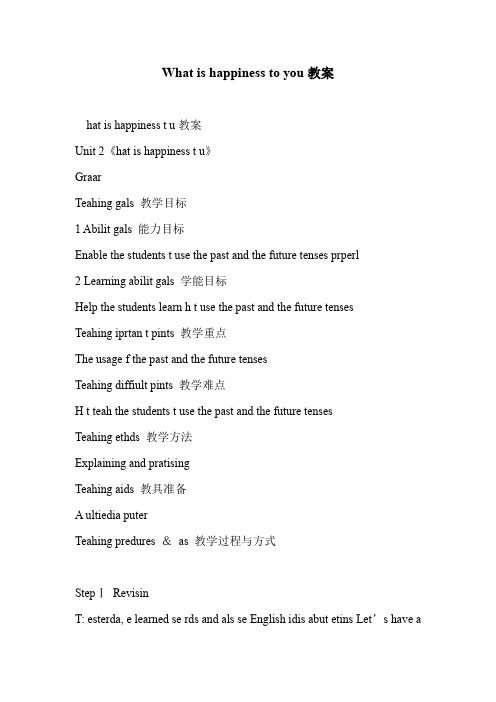
What is happiness to you教案hat is happiness t u教案Unit 2《hat is happiness t u》GraarTeahing gals 教学目标1 Abilit gals 能力目标Enable the students t use the past and the future tenses prperl2 Learning abilit gals 学能目标Help the students learn h t use the past and the future tensesTeahing iprtan t pints 教学重点The usage f the past and the future tensesTeahing diffiult pints 教学难点H t teah the students t use the past and the future tensesTeahing ethds 教学方法Explaining and pratisingTeahing aids 教具准备A ultiedia puterTeahing predures &as 教学过程与方式StepⅠRevisinT: esterda, e learned se rds and als se English idis abut etins Let’s have arevisin Tr t explain the in English The first ne: ht under the llar?S: The idi eans that sebd is ver angrT: D u a gree?Ss: esT: Next ne: dn in the dups?S: Let e have a tr The idi expressed the feeling f sadnessT: u are right The last ne: n lud nine?S: That eans sene is ver happT: rret!u all have dne a gd revisinStepⅡPresentatinSh students the flling sentenes, and as the t spea ut the differene1 He ent t Paris t ears ag2 He ill g t Paris next earT: Please l at the t sentenes an u tell the differene beteen the?S: The first sentene tals abut sething that happened in the past and the send sentene tals abut sething that happens in the futureT: Exatl!Step ⅢExplanatinGet the students t tal abut the different frs f the past tense and the future tenseT: e have learned hat the past tense is and hat the future tense is There are an frs f eah tense Let’s deal ith the past tense first Please l at the flling sentenesSh students the flling sentenes1 Sang Lan as brn in Ningb, hina in 19812 She ne that in thse ears she as aing her parents prud3 Instead f ring abut hat she had lst, Sang Lan thught abut hat she uld d t get better4 B the tie she peted in the Ne r Gdill Gaes, she had been a dediated unir gnast fr eleven earsT: First, l at the fur sentenes D the have sething in n?S: es! The all use the past tenseT: But there are als differenes ang the an u tell the differenes? Next, disuss ith ur partners Pa attentin t the itali rdsSeveral inutes laterT: an u sh ur pinins n?Ss: esS: In the first sentene e use the siple past tense t tal abut sething happened in the pastT: Ver gd hat abut the send sentene?S: I thin it eans sething happened in the past and ntinued fr se tieT: Ver gd! Than u! N let’s ve t the last t sentenesS: The are bth used in the past perfet tense B ling at the t sentenes, I thin e u se the past per fet tense t tal abut things that happened in the past and stpped befre anther past atin beganT: Exellent! But I thin u are partl right D the t sentenes express the sae eaning?S: The furth sentene eans the thing happened in the past and at that tie anther past atin beganT: That’s it! ust n e taled abut different frs f the past tense And later, e ill d re pratie abut the N let’s ve t the future tense Please l at the flling sentenes an u tell the differene?Sh students the flling sentenes:1 She ill e ith us t ath the ftball ath trr2 I shall r hard and learn t bee a gnast3 Tda, I’ging t tal abut h t find happiness4 Dr Brain ill be taling abut suess next tieBefre she ent t the Gdill Gaes, Sang Lan tld her parents she as ging t in her eventSeveral inutes laterT: Are u read t sh e ur ansers?Ss: es!S: I ill have a tr In sentenes1, 2, 3 the siple future tense is used hen the subet is the first persn, e usuall use shall instead f illT: u are ri ght Then hen shall e use “be ging t”?S: I thin hen e ant t tal abut future plans and intentins, e an use “be ging t”T: Ver gd u gt the anser hat abut sentene 4?S: Sentene 4 uses the future ntinuus tense This sentene is used t tal abut sething that ill start in the future and ntinue fr se tieT: Exellent! The fifth sentene is used in the future in the past hen shall e use this tense?S: hen e ant t tal abut an event hih as in the future at the tie hen it as disussedT: u gt the anser Gd b! Next I’ll sh u further explanatins abut future tense Sh the flling t the students and as the t tae se ntes1 ill / shall d 表示纯粹的将或临时做出的决定,也可表示一种必然的趋势。
高二英语What-is-happiness-to-you课件
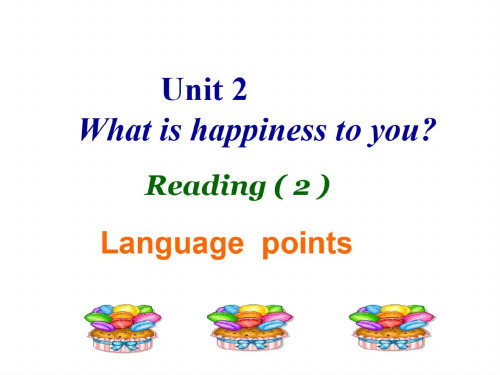
高二英语What-is-happiness-to-you课件7
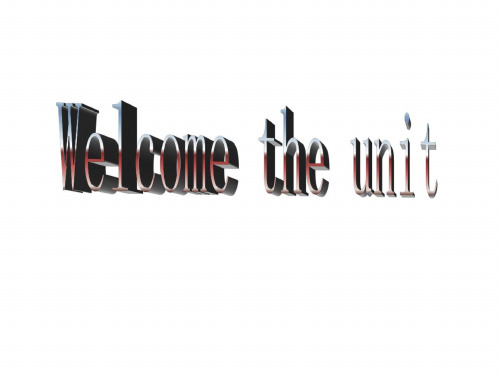
“要买点菜吗?下午才从地窖里拿出来,保证新鲜。”老人家微笑着对我说。bodog很卡 我原本是没意思到老人家的地摊上欣赏风景的,或是好奇也或是灵感吧,我不自觉地走近了些,打量了一下老妇人,老人家已经两鬓斑白,粗糙的手背上青筋暴露,饱经风霜的脸上挂满笑容,深陷 的皱纹刻录着年久的岁月印痕。 我突然有些感慨,说不来的那种情绪在渲染。 老人家继续问我:“屋里热,是出来乘乘凉了?” 我在老人家面前蹲了下来:“老奶奶,这都半夜了,您还在买菜啊?太晚了,您该回家去了,家里人会担心的。” “没事。今天出来的有点晚了,这些菜还都还没卖完哩。等清早起来,就有人来买了。回家是不可能的了,家里我都安排好了。” “那您早上再来也行啊,不能在这等到天亮啊?”我做起了动员。 “那不行,一来一回十好几里路,都累在路上了。再说,这时候回去,有很长一咕噜路没灯,黑乎乎地不好走。反正天气也热,在这靠着歇一根 水灵灵的黄瓜递给我,“给,尝尝咱家菜园里的黄瓜,跟你在别的地方买的不一样。” 我接过来一看,这根黄瓜的确是很鲜嫩,也的确是新摘下来的。可能是同情心的驱使吧,我看着布单上摆放的十几根黄瓜说道:“老奶奶,您这些黄瓜我都要了,多少钱?”
高二英语What-is-happiness-to-you课件
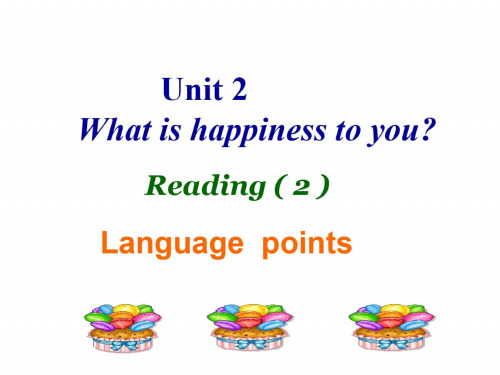
ቤተ መጻሕፍቲ ባይዱ
高二英语What-is-happiness-to-you课件
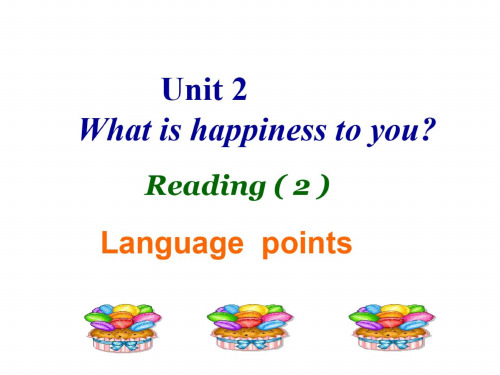
人们所不知道的是在战争年代,柳树枝起到其它物品替代不了的作用。在抗日战争、解放战争、抗美援朝中,因为我军没有制空权,日本与美帝国主义利用空中力量,对地面上的我军与民间设施进 行狂轰乱炸,为对付侵略者的空袭,我军将士把柳树编织成一顶帽子,戴在头上,目的是这种伪装使空中的敌机发现不了轰炸目标。足球分析
从小我们在军营露天电影里看到,行军中的我军将士们头戴柳树做成的帽子,在战壕里狠狠地打击敌人。头戴柳条帽的战士们,是我们幼小心灵中的英雄,在大院的孩子们眼里,戴这种柳条帽是一 种英雄的象征。
记得小时候我们一帮孩子玩游戏,就喜欢做个柳树帽,戴在头上军营里满院子跑,那时的军营里有得是柳树,可以让我们这帮孩子们折腾,大点的男孩子先爬到树上摘,我们女孩子摘伸手可够到的 地方。我们先从一棵柳树上折下一根嫩绿的枝条,把它编织绕成圈,一直绕到没有枝条为止。第一次我们以为成功了,戴在头上跑起来没多久就散架了。怎样才能让它不散架?我们一帮孩子们绞尽脑汁, 七嘴八舌不知所措,不知怎样才能做成牢固的帽子。这时一位解放军叔叔来到我们个小圈,然后把多余地枝条一 扭一扭地卷在比划好的大小树枝条上,最后把一点头插进前面卷过的地方。这样一顶外型酷似花圈的帽子就完成了,戴在头上怎么跑都不会掉下来。这个方法我们这帮孩子很快就学会了,从此,军营的 操场上经常看到一帮孩子们,头戴柳条帽、手拿细竹杆口里喊着“冲啊!杀啊!”满军营的疯跑。
高二英语What-is-happiness-to-you课件7
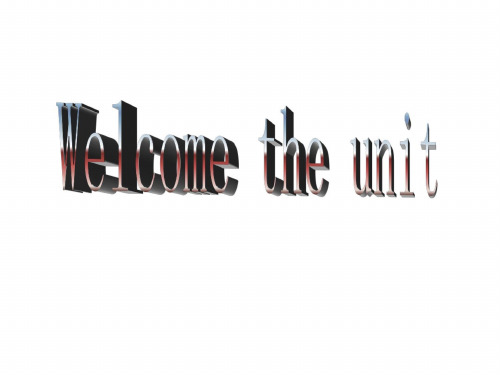
- 1、下载文档前请自行甄别文档内容的完整性,平台不提供额外的编辑、内容补充、找答案等附加服务。
- 2、"仅部分预览"的文档,不可在线预览部分如存在完整性等问题,可反馈申请退款(可完整预览的文档不适用该条件!)。
- 3、如文档侵犯您的权益,请联系客服反馈,我们会尽快为您处理(人工客服工作时间:9:00-18:30)。
Unit 4: Reading comprehension
8. How does the author define happຫໍສະໝຸດ ness?Reference
According to the author, happiness lies neither in having nor in being, but in becoming. It lies in the process of the pursuit.
Reference
Ex. I,
p.53 In Americans’ perspective, happiness means possessing
enough.
Unit 4: Reading comprehension
2. Why do the forces of American commercialism make people unhappy?
Unit 4: Exercises
• Exercises
➢ Reading Comprehension ➢ Structure of the Text ➢ Vocabulary ➢ Cloze ➢ Translation
Unit 4: Reading comprehension
1. According to paragraph 2, what does happiness mean to Americans?
Unit 4: Reading comprehension
6. How does Thoreau pursue his happiness?
Reference
Thoreau saved time and effort from (what he thought) low levels of happiness and spent them on high levels of happiness.
Unit 4: Reading comprehension
7. According to paragraph 11, what’s the relationship between difficulty and happiness?
Reference
According to the author, happiness is built on the difficulty we undertake. There would be no happiness if there were no difficulty.
Reference
On the front pages of the women’s magazines advertising always describes the wonderful dream every woman has hoped for to attract her and then turns to the key point, focusing on promoting the products and the approaches which are thought to be reliable to make her dream come true in the back pages.
Unit 4: Structure of the text
Text Outline
1. Introduction (Paras. 1–2)
Ex. II, pp.53-54 2. Body (Paras. 3–14)
Unit 4: Reading comprehension
5. How does the holy man of India pursue his happiness?
Reference
The holy man of India needs and wants nothing materially. His happiness lies in contemplation and he achieves it through the demanding discipline.
Unit 4: Reading comprehension
4. Why is the happiness-market not running out of customers?
Reference
Although even abnormal and insensible people can hardly believe what the advertisement has depicted, there are some persons who are dedicated to the ideas that the advertisement has prompted and firmly believe that their dreams can come true if they follow the steps as the advertisement has described.
Unit 4: Reading comprehension
3. What does the author mean by saying that “advertising begins as poetry in the front pages and ends as pharmacopoeia and therapy in the back pages”?
Reference
Because the forces of commercialism make people have strong desire for what they want, which is often more than their budgets can satisfy. Their insatiable demands make them dissatisfied with what they possess.
